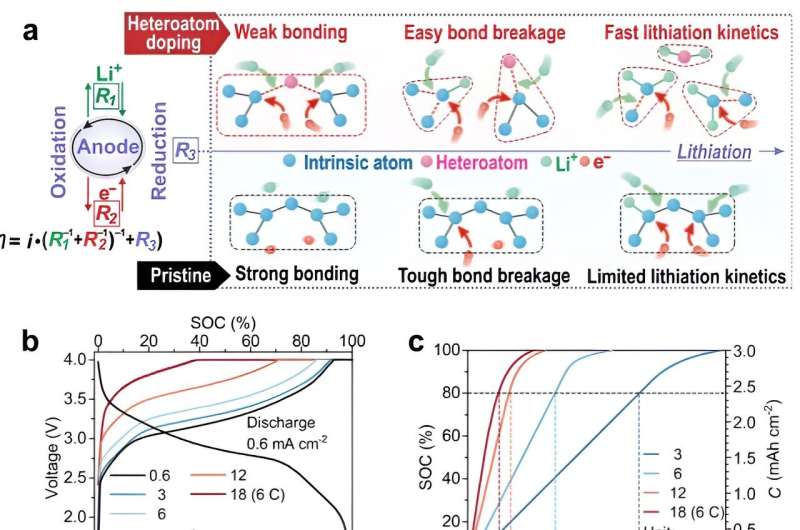
September 24, 2024 by University of Science and Technology of China
Collected at: https://techxplore.com/news/2024-09-electrocatalytic-strategy-enables-ultrafast-lithium.html
A team has developed a novel strategy for solid-state electrocatalysis in lithium-ion batteries (LIBs), transcending the paradigm confining electrocatalysis to liquid-solid and gas-solid interfaces. Their study is published in the Journal of the American Chemical Society.
In LIBs, anode materials that use alloying reactions to store Li ions, such as silicon and phosphorus, are widely used due to their high specific capacity compared to conventional graphite anodes. However, the sluggish lithiation kinetics in these anode materials limits the fast-charging performance of LIBs.
Moreover, during the Li-alloying reaction of anode materials, the reactants and products are in solid phases, lacking the two-phase interface typically required for conventional electrocatalysis. Therefore, there is an urgent need to explore electrocatalysis in solid-state reactions.
To address this challenge, the team employed heteroatom doping, specifically boron for silicon and sulfur for phosphorus, to accelerate Li-alloying reactions in solid-state electrode material. Theoretical calculations and X-ray absorption spectroscopy (XAS) revealed that a critical heteroatom doping concentration (1~5 atom %) can provide highly active sites for the alloying reactions of anode materials, promoting intrinsic chemical bond breaking. This bond cleavage at doped sites causes the anode materials to continuously split into smaller unit cells, creating more reactive sites and enhancing reaction dynamics.
The team successfully applied this strategy to create an ultrafast-charging battery consisting of a sulfur-doped black phosphorus (S/bP) anode coupled with a lithium cobalt oxide (LCO) cathode. The battery demonstrated an impressive performance of recharging 80% of its energy in 9 minutes with an energy density of 302 Wh kg-1, surpassing previously reported LIBs. Furthermore, this ultrafast-charging performance remained stable over more than 300 cycles.
This research enables electrocatalysis in solid-state reactions, which signifies a crucial step towards high-energy and fast-charging battery technology, showcasing great potential for industrial application. The study was led by Prof. Ji Hengxing And Prof. Wu Xiaojun from the University of Science and Technology of China (USTC), in collaboration with Prof. Duan Xiangfeng’s team from the University of California, Los Angeles.
More information: En Zhou et al, Solid-State Electrocatalysis in Heteroatom-Doped Alloy Anode Enables Ultrafast Charge Lithium-Ion Batteries, Journal of the American Chemical Society (2024). DOI: 10.1021/jacs.4c03680
Journal information: Journal of the American Chemical Society

Leave a Reply